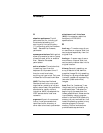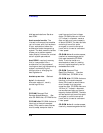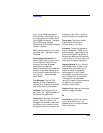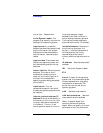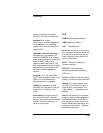
Glossary
223
that runs at 20 Mbytes/second,
which allows a cable length of up
to 3 meters and a transfer rate of
up to 20MB per second See also
Ultra2 Wide Low-Voltage
Differential SCSI, Small Computer
System Interface.
file The basic named unit of data
stored on disk See also directory,
filename.
file access permissions The
access rights given to a particular
file or directory. Every file and
directory has a set of access
permissions, a code that
determines whether a process can
perform a requested operation on
the file (such as opening the file or
writing to it) See also access
permissions.
File Manager The HP CDE
application that allows you to
manage your files and directories,
and to set viewing preferences.
filename The name given to a
particular file See also absolute
pathname, file, pathname.
file server A workstation whose
primary task is to control the
storage and retrieval of data from
hard disks. Any number of other
workstations can be linked to the
file server via a LAN in order to
use the file server to access data.
file system The hierarchically
organized set of files and
directories on a hard disk.
firmware The control software
that is embedded in ROM and is
always resident regardless of the
status of the operating system. It
handles the booting of the system,
initialization of I/O, and starts the
loading of the operating system.
floppy diskette A thin, flexible,
disk-shaped sheet of plastic that
magnetically stores data on its
coated surfaces. Floppies are
contained within stiff plastic
“envelopes” to protect them from
dust, fingerprints, and abrasion.
The floppy drive uses heads
(similar to heads in tape recorders)
to read and write data on
concentric disk tracks.
floppy drive A device that stores
data on a floppy diskette.
H
hard disk A type of disk that is
rigid—often aluminum—as
opposed to a thin plastic diskette,
which is flexible.





